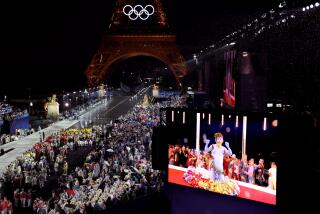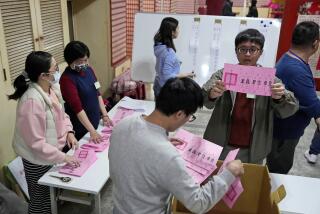Dam Building and Acrobatics Featured : No ‘Goddess’ Shown on China TV
- Share via
CANTON, China — Wu, a physician and viewer from afar of China’s student democracy movement, listened with amusement Tuesday to a description of the “Goddess of Democracy” statue that students have erected in Beijing’s main square.
As the visitor’s tale ended, Wu moved to switch on the nightly national news on television broadcast from the capital.
“I am doubtful,” he said as a map of China appeared on the screen. “That kind of thing probably won’t be shown.”
Wu’s doubts were well founded, for a brief opening of the window of China’s televised news has been shut. On Tuesday’s broadcast, no crowds in Tian An Men Square were shown, nor was the raising of the enormous statue clutching a torch, looking somewhat like the Statue of Liberty in New York harbor. No fresh-faced students pleaded that their message be carried forth to all corners of the land.
Stories on Troops, Dam
Instead, there was a report on troops camped on the outskirts of Beijing--they were shown goose-stepping for a visiting Communist party dignitary; a story about the building of a dam--plenty of pictures of earth movers moving earth; and one about the return of a young acrobatics team from a triumphant tour of Italy--scenes of kids balancing trays piled high with champagne glasses on their feet.
“Well, maybe last week they would have shown it, but not now,” said Wu, sighing and flicking off the set.
The difference between last week and this is the apparent strengthening of hard-line leaders in Beijing in their battle with political reformers, led by the embattled Communist Party leader Zhao Ziyang.
A week ago, Chinese government television, called CCTV, offered lively accounts of the turbulence in Beijing. It was perhaps the first time under Communist rule that television gave freewheeling coverage to any controversial domestic event.
The venture into uncensored TV was not to last.
Reports from Beijing say that Premier Li Peng, the conservative who appears to be coming out on top in the power struggle in the party’s top ranks, has handpicked a five-member committee to watch for transgressions in the press and on television. The committee takes over from Hu Qili, the party’s propaganda chief and a close associate of Zhao who has probably lost his seat on the ruling Politburo.
Hu had not been known generally as one who gave television news free rein. But as the struggle in Beijing developed, half a billion potential viewers were treated to a rare, clear account of Chinese events.
During the course of a week, CCTV carried several dramatic moments of the student movement.
There was the May 18 confrontation between student leaders and Li. Students had demanded that Li not only meet with them but that the proceedings be televised. They were, and the students took every advantage.
They accused Li of talking around their demand for greater democracy. The cameras made the 60-year-old premier look doddering and jowly. Some students who were on a hunger strike looked valiant and long-suffering. One wore a hospital cloak and fainted at the end of the meeting.
Li appeared again on television the next day, this time among people more his age. He was shown in the Great Hall of the People making a speech to party functionaries, some of whom appeared to be propped up by their heavy Mao jackets. Li then disappeared from view for a few days, replaced by messages read into the camera or flashed on the screen.
Meanwhile, in a moment of unfettered reporting, a TV journalist interviewed a soldier on the street who admitted that his troops could not enter the city because of barricades put up by the demonstrating students and the masses of citizens blocking their way.
“Under such circumstances, we feel very embarrassed,” the officer admitted.
Was Shown Greeting Envoys
Finally, last Thursday, Li appeared once more, but this time in the ritualized role of a leader in charge: He greeted ambassadors from other countries, telling them that all China is tranquil.
Television also slipped into a ritualized role. The news broadcasts returned to their previous pat manner. Several opened with written messages from government organizations urging the students to give up.
While other cities and provinces have no alternative to the official view, television viewers in Hong Kong do, and some residents of this southern city can pick up their news from there. Only 75 miles away, Hong Kong beams its own news programs here, along with a dominant fare of soap operas, American-made sitcoms and sexy swimwear ads.
For good reception, the Cantonese put up antennas that are nicknamed “fish bones” because of their shape. Recently, the provincial government urged viewers to abandon Hong Kong television because of its immoral tendencies, but a look at the fish bone-rich Canton skyline suggests that hardly anyone took the advice seriously.
‘Silly’ to Restrict News
“To us it seems silly for the government to restrict news. We can get all we want from Hong Kong,” said Wu. He added that he sympathizes with the students but has taken no part in the few demonstrations that have occurred in Canton.
The Hong Kong news opened not only with a report on the “Goddess of Democracy” but also with news that police in Beijing may have rounded up several union activists in secret arrests. Wu did not switch back to CCTV after the news but kept on watching the Hong Kong channel, where “The Graduate,” starring Dustin Hoffman, was set to play.
More to Read
Sign up for Essential California
The most important California stories and recommendations in your inbox every morning.
You may occasionally receive promotional content from the Los Angeles Times.










